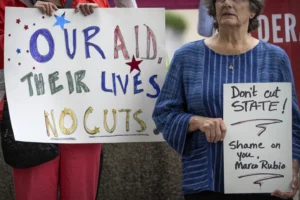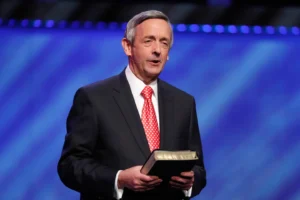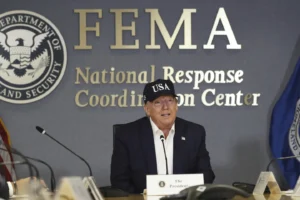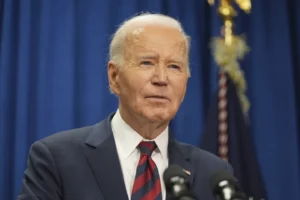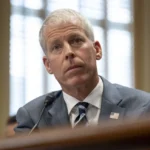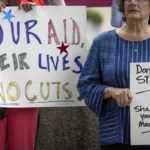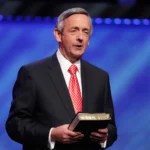Wyoming Superintendent Testifies at Fiery House Hearing on School Book ‘Bans’
Degenfelder said explicit content should be kept out of schools, opposed federal intervention
- Published In: Politics
- Last Updated: Oct 20, 2023
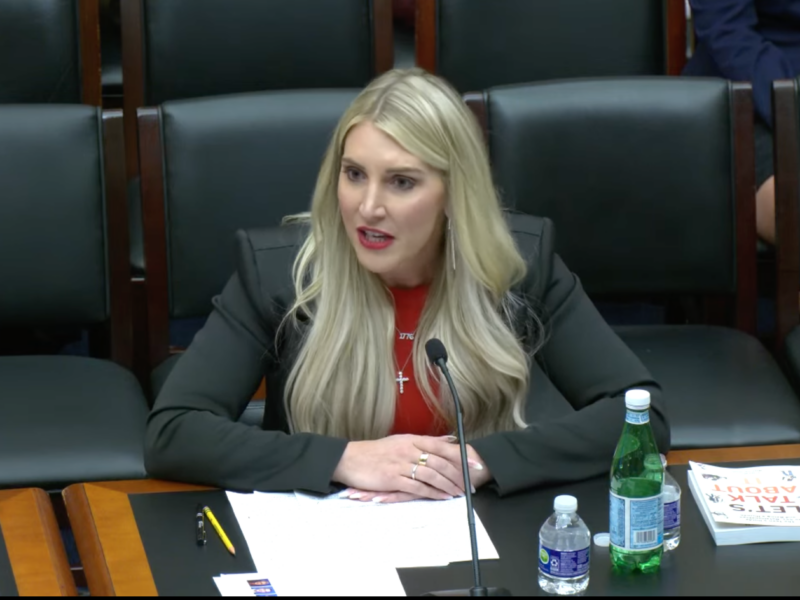
Wyoming Superintendent of Public Instruction Megan Degenfelder testified before a House subcommittee Thursday in a hearing exploring efforts to remove allegedly explicit material from school libraries. (Photo via YouTube / House Committee on Education & the Workforce)
By Jacob Gardenswartz
Special to the Wyoming Truth
WASHINGTON — Wyoming Superintendent of Public Instruction Megan Degenfelder testified on Capitol Hill Thursday at a hearing exploring a growing conservative movement to remove allegedly explicit books from school libraries.
The hearing, entitled “Protecting Kids: Combatting Graphic, Explicit Content in School Libraries,” was hosted by the House Education Committee’s subcommittee on early childhood, elementary, and secondary education. Also present to provide testimony were Lindsey Smith, a parent and chair of her local “Moms for Liberty” group, Max Eden, a research fellow at the conservative think tank American Enterprise Institute and Jonathan Friedman, director of free expression and education programs at the free speech advocacy organization PEN America.
From the onset, the committee’s Republicans sparred with Democrats over whether the matter in question was even a real issue.
“Do communities have the right to remove inappropriate content from library shelves? Of course they do,” subcommittee chairman Rep. Aaron Bean (R-Fla.) said in opening statements. “Removing a book from a library shelf is not akin to pouring gasoline on it and setting it ablaze… it’s not banned.”
Ranking Democrat Rep. Susan Bonamici (D-Oregon) shot back, suggesting a “far right conservative movement” to ban books writ large “is having a profound real-life effect on children, on educators and importantly on school librarians.”
She pointed to a recent report from PEN America that found 3,362 instances of books removed from public K-12 schools last school year, a 33% increase from the year prior. That encompassed over 1,500 individual titles, including Toni Morrison’s “Bluest Eye”and John Green’s “Looking for Alaska,” with significant numbers of those books focusing on LGBTQ+ protagonists or others with marginalized identities — titles like Maia Kobabe’s “Gender Queer,” a memoir about life outside the gender binary, and Patricia McCormick’s “Sold,” which explores the story of a young Nepalese girl sold into slavery.
“Organized groups of activists and some politicians have launched a campaign to exert ideological control over public education, unprecedented in its scope, scale and size,” Friedman, one of the researchers behind the report, testified. “We can and must distinguish between a single parent raising a concern with the school and the current campaign to disrupt public education writ large.”
Smith, whose group is at the forefront of a nationwide campaign to remove controversial books from school library shelves, claimed her focus was on “the innocence and protection of our children.”
“We don’t show porn in the name of education to children,” she testified. “What will start as library books will flow into the classrooms.”
Degenfelder agreed, testifying that “fear of inappropriate and sexually explicit materials in schools” is “destroying trust and confidence in our public education.” Such comments echoed what she told the Wyoming Truth last year about sexually explicit books during her campaign.
“They don’t need to be seeing that,” she previously said of books with explicit material. “Our kids should only be seeing material which is appropriate to grade level.”
But despite her stated desire to remove such topics from school library circulation, Degenfelder on Thursday said she opposed the federal government playing any role in local school curricula or library offerings.
“How do we solve this issue? It certainly should not be left up to the federal government,” she added. “I respect local control in government, including authority of books and curriculum by locally elected school boards.”
Feds hands tied as books shelved throughout Wyoming and the nation
In June, President Joe Biden promised to name a book ban “coordinator” to handle the administration’s response to the issue in schools nationwide. The Department of Education made good on that pledge last month, quietly appointing Mathew Nosanchuk — who had previously worked on national security, LGBTQ+ and Jewish community advocacy roles in the Obama administration — to the post.
When he first announced the position during an LGBTQ+ pride event, Biden suggested the White House had a role to play in protecting students’ rights to freedom of speech and expression.
“Book bans may violate the federal civil rights laws when they target LGBTQ students or students of color and create hostile classroom environments,” he said.
But in reality, the federal government’s ability to engage on the issue is highly limited. While the U.S. Education Department can investigate allegations of discrimination against students and issue guidelines for local school districts about what’s allowed under federal law, it has few mechanisms to intervene in local school policies.
Thus far, there’s only one example of the department engaging with a school district on a book banning matter — pursuing a “review” of the issue in Forsyth County Schools in Georgia. But the department’s subsequent “resolution agreement” with the school district focused almost exclusively on how schools communicate book removals to students, with district leaders promising to more clearly announce when titles are removed from circulation. The agency in no way required the district to restock titles which had been removed.
In Wyoming, the issue of book bans has not been reserved for schools. Clashes between local librarians and the communities in which they work have spread throughout the state, after Campbell County library director Terri Lesley was fired by the library board for refusing to “weed” out books which contained “obscene sexually explicit or graphic materials.” Some officials have gone so far as to suggest prosecuting librarians who stock disputed books.
This summer, Wyoming Library Association president Conrrado Saldivar told the Wyoming Truth the efforts to remove books show marginalized students “that their stories aren’t worth telling and are inappropriate.”
“The ‘Live and Let Live’ [mentality] of the Wyoming I grew up in is under attack, and our younger generations are the ones who are going to suffer the most because of it,” Saldivar concluded.
Degenfelder, for her part, took a more middle-of-the-road approach, stressing the need to have clear policies that protect the rights of both parents and their children.
“I think it’s incredibly important to have transparency, to have processes in place and to have public input,” she testified. Book bans “cannot step beyond the bounds of the rights of parents.”


